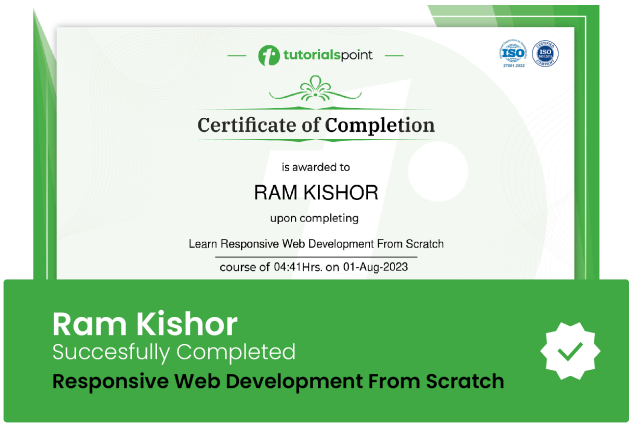To become an outstanding project manager and not to burn out
IT project management course for project and product managers of Junior and Middle level
Lectures -6
Quizzes -1
Duration -2.5 hours

30-days Money-Back Guarantee
Get your team access to 10000+ top Tutorials Point courses anytime, anywhere.
Course Description
My course will teach you how to manage projects in a God mode) I will tell you how difficult and dangerous the career of a project manager is in a dynamic and intense manner. Besides this, I will also provide you with recommendations and tools to apply the acquired knowledge in your practice today. I will share the life hacks that will allow you to avoid customer complaints like some bullets in Matrix)
There will be no boring lectures about methodologies and terminology. You will hear no morals or trite banalities. I will give you only the essence as it is, many practical issues and analyses of fuckups I have seen and made over my eight-year experience leading a team of project managers. I should also mention that the basic material is aimed at fulfilling projects on customer demand (outsourcing). Nevertheless, this material's major part will also be suitable for managing the company's internal projects.
Now push the button and GO!
About the speaker and his projects
Introduction to the profession and main skills
Starting the project:
Budget and deadlines
Agreement
Customers requirements
Development methodology (Waterfall (incl. hybrid), Agile/Scrum)
Gantt Chart
Kanban board (Trello)
What one should think over beforehand:
Versioning storage system (GIT)
Interrelation analysis
Code documentation
The initial project is 80% of completion
Work speed
User-friendly administration
Solution versatility
Project architecture/code purity
Project documentation (with examples):
Specification (links to concepts)
Functional Tasks
Concepts
Design Brief
Content scheme
Rules of developing a functional task (example)
The universality of proposed solutions and their cost
The complication of project documentation in the course of discussion
Not to forget to discuss with the client
PM life hacks
Project management process:
Freelance letter structure
One-and-a-half rule
Production schedule
Gantt Chart
Daily report (sample)
Intermediate testing
Code review organization
Hands-on principle
Poor management
Communication with the client
Working with additions and changes
Tracking changes
Testing:
"I am not a tester"
Testing scenario
Testing checklist
Working with a tester
Developments from testing
Testing methodologies: boundary values, loading, and A/B test
Project delivery:
List of bugs and wishes
List of tasks for free execution and signing of the protocol
User’s instruction
Backup
Questionnaire for the customer
Maintenance:
The free technical support period
Maintenance period
Task classification and response time
Support schedule
Dev → Release Test → Prerelease → Release Work
Estimating the plan and fact specialists' time
Monthly reports
Time conditions
Shifting from outsourcing to an outstaffing model
Dealing with contractors:
Formation of a team
Work with full-time and freelance specialists
Planning and estimating tasks
The climate in your team
Technical literacy
Accounts and accesses
Confirmation letter
Risks and preliminary measures
Working with the client:
Selling your expertise
Rules of comunication
Planning deadlines
Not always agreeing with a customer
Informing about your mistake
Leaving the chat room with the team
Documents approval
Working with tough clients
Communication management
Crisis management:
Knowing the project is going to hell
The "red flags" of customer dissatisfaction
Global nature of errors
Working with missed deadlines
Maximum combat readiness
List of tasks and setting priorities
Processing of customer complaints
Effective types of communication
Putting the fire down and searching for the arsonist
Analysis of reasons and solutions
Increase loyalty and get some extra tasks
Planning the top-priority / time-limited project
Risk mitigation plan
Responsibility for customer losses
Draw conclusions and reflect on the development rules
Soft skills:
Top 5 time management rules
Ways of effective communication
Basic sales skills
Work-life balance and burning out
Project profit vs. period of its implementation
Theory of constraint: the narrow neck
Data exchange: tips & tricks
Useful software:
For simultaneous work
Kanban boards
Drawing a design
Communication tools
Gantt Charts tools
Password generation and storage
Goals
What will you learn in this course:
The course goals are to cover the following concepts:
- Waterfall (incl. hybrid), Agile/Scrum
- Gantt Chart
- Kanban board
- Testing methodologies
- Development process
- Teamwork principles
- Working with a client
- Risk management
- Crisis management
- Time management
Prerequisites
What are the prerequisites for this course?
The course is designed for a wide audience with a minimum entry level. However, students are expected to have intermediate or higher computer and internet proficiency. The most effective course will be for project managers who have already participated in the development of IT projects or products.

Curriculum
Check out the detailed breakdown of what’s inside the course
Intro. Starting a project
1 Lectures
-
Intro. Starting A Project 28:04 28:04
Project documentation. Management process.
1 Lectures

Testing, delivery and support
1 Lectures

Communication with clients and your team
1 Lectures

Soft skills and useful software
1 Lectures

Final quiz
1 Lectures

Instructor Details

Anton Cucer
Course Certificate
Use your certificate to make a career change or to advance in your current career.

Our students work
with the Best


































Related Video Courses
View MoreAnnual Membership
Become a valued member of Tutorials Point and enjoy unlimited access to our vast library of top-rated Video Courses
Subscribe now
Online Certifications
Master prominent technologies at full length and become a valued certified professional.
Explore Now


 Updated on May, 2024
Updated on May, 2024
 Language - English
Language - English
